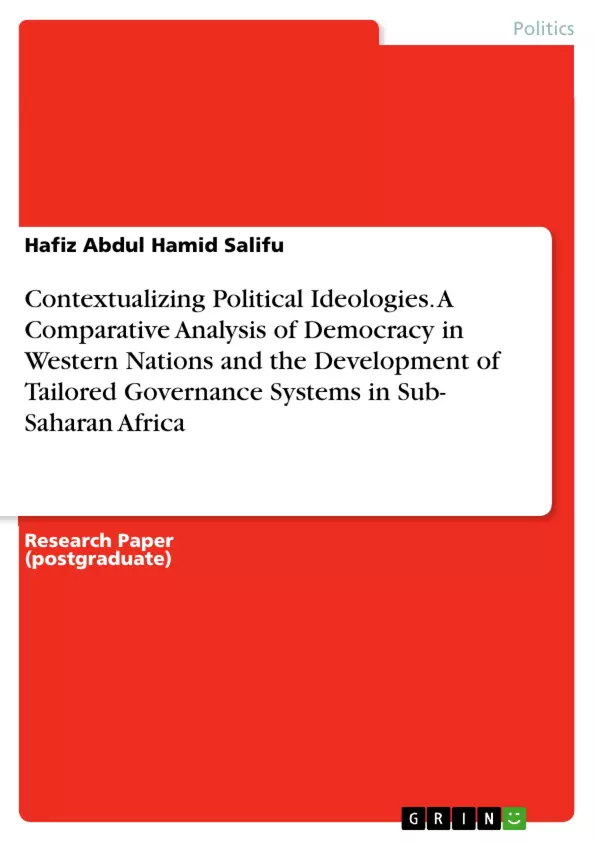This paper explores the complexities of applying Western democratic principles in Sub-Saharan Africa, focusing on the historical, socio-economic, and cultural contexts that shape governance systems. By comparing Western democracies such as the United Kingdom, Germany and France with tailored governance systems in Sub-Saharan Africa, specifically Nigeria, Ghana, South Africa and Kenya, the study highlights the distinct challenges and adaptations in these regions. The analysis is grounded in theoretical discourse on democracy, employing both quantitative and qualitative methods to examine the nuances of political and social rights and citizen participation.
Inhaltsverzeichnis (Table of Contents)
- Abstract
- Keywords
- Introduction
- Theoretical Foundations of Democracy
- Western Democracies
- Democracy in Sub-Saharan Africa
- Comparative Studies
- Methodological Approaches
- Gaps in the Literature
- Conclusion
- Brief Historical Overview of Democratic Development
- Western Democracies
- Classical Antiquity
- Medieval and Early Modern Period
- Modern Period
- Sub-Saharan Africa
Zielsetzung und Themenschwerpunkte (Objectives and Key Themes)
This paper investigates the challenges and adaptations of implementing Western democratic principles in Sub-Saharan Africa. It compares democratic governance systems in Western nations (UK, Germany, France) with tailored governance systems in Sub-Saharan Africa (Nigeria, Ghana, South Africa, Kenya). The study analyzes the historical, socio-economic, and cultural contexts that influence governance systems and incorporates both quantitative and qualitative methodologies to assess political and social rights as well as citizen participation.
- Comparison of Western and Sub-Saharan African governance systems
- Influence of historical, socio-economic, and cultural contexts on democracy
- Analysis of political and social rights and citizen participation
- Exploration of tailored governance models in Sub-Saharan Africa
- Application of theoretical frameworks on democracy to diverse contexts
Zusammenfassung der Kapitel (Chapter Summaries)
- Introduction: The study's objective is to compare Western democratic ideals with governance systems in Sub-Saharan Africa, drawing on existing literature to contextualize the analysis.
- Theoretical Foundations of Democracy: This section explores key theoretical frameworks on democracy, including T.H. Marshall's work on citizenship and social rights and Robert Dahl's concept of "polyarchy," providing a foundational basis for the study.
- Western Democracies: This chapter examines the literature on Western democracies, highlighting contributions from scholars like Alexis de Tocqueville, Robert Putnam, and Pippa Norris, emphasizing the role of civic engagement, social capital, and political culture in sustaining democratic institutions.
- Democracy in Sub-Saharan Africa: This section explores the literature on Sub-Saharan African democracies, focusing on the unique historical and socio-political context of the region. It examines the works of scholars like Michael Bratton, Nicolas van de Walle, Mahmood Mamdani, and Afrobarometer, highlighting the interplay of traditional and modern governance structures and the impact of colonial legacy on contemporary governance.
- Comparative Studies: This chapter examines comparative analyses of Western and African democracies, drawing on the works of Larry Diamond and Steven Lindberg. These studies underscore the importance of context-specific approaches in understanding democratic governance, emphasizing the influence of institutional quality and political culture.
- Methodological Approaches: This section discusses methodological approaches for studying democracy, emphasizing the integration of qualitative and quantitative data. It highlights the mixed-methods approach advocated by King, Keohane, and Verba, and the use of large-scale data in projects like the Varieties of Democracy (V-Dem) project.
- Gaps in the Literature: This chapter identifies a gap in the literature, particularly in comparative studies integrating both qualitative and quantitative data for a comprehensive analysis of democratic practices across regions. This study aims to fill this gap by offering an in-depth comparative analysis of Western and Sub-Saharan African governance systems.
Schlüsselwörter (Keywords)
The study focuses on the core concepts of Western democracies, Sub-Saharan African governance, political rights, social rights, citizen participation, comparative analysis, democratic institutions, and political culture.
- Arbeit zitieren
- Hafiz Abdul Hamid Salifu (Autor:in), 2024, Contextualizing Political Ideologies. A Comparative Analysis of Democracy in Western Nations and the Development of Tailored Governance Systems in Sub- Saharan Africa, München, GRIN Verlag, https://www.grin.com/document/1490789



